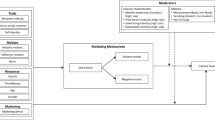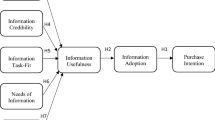Abstract
Although consumers are increasingly engaged with ethical factors when forming opinions about products and making purchase decisions, recent studies have highlighted significant differences between consumers’ intentions to consume ethically, and their actual purchase behaviour. This article contributes to an understanding of this ‘Ethical Purchasing Gap’ through a review of existing literature, and the inductive analysis of focus group discussions. A model is suggested which includes exogenous variables such as moral maturity and age which have been well covered in the literature, together with further impeding factors identified from the focus group discussions. For some consumers, inertia in purchasing behaviour was such that the decision-making process was devoid of ethical considerations. Several consumers manifested their ethical views through post-purchase dissonance and retrospective feelings of guilt. Others displayed a reluctance to consume ethically due to personal constraints, a perceived negative impact on image or quality, or an outright negation of responsibility. Those who expressed a desire to consume ethically often seemed deterred by cynicism, which caused them to question the impact they, as an individual, could achieve. These findings enhance the understanding of ethical consumption decisions and provide a platform for future research in this area.
Similar content being viewed by others
References
Ajzen, I.: 1988, Attitudes, Personality, and Behavior, Dorsey, Chicago, IL.
Anniss, E.: 2003, ‘Sweatshops vs. Goldmines of Expertise’, Financial Times, Main section, 1st Edition, December 13.
Barnett, C., P. Cafaro, and T. Newholm: 2005, ‘Philosophy and Ethical Consumption’, in R. Harrison, T. Newholm and D. Shaw (eds.), The Ethical Consumer, (Sage, London), pp. 11-24.
Berry, H. and M. G. McEachern: 2005, ‘Informing Ethical Consumers’, in R. Harrison, T. Newholm and D. Shaw (eds.), The Ethical Consumer, (Sage, London), pp. 69-88.
Boulstridge, E. and M. Carrigan: 2000, ‘Do Consumers Really Care About Corporate Responsibility? Highlighting the Attitude-Behaviour Gap’, Journal of Communication Management 4(4), 355-368.
Carrigan, M. and A. Attalla: 2001, ‘The Myth of the Ethical Consumer - Do Ethics Matter in Purchase Behaviour?’, Journal of Consumer Marketing 18(7), 560-577.
Chatzidakis, A., S. Hibbert and A. Smith: 2006, ‘Ethically Concerned, Yet Unethically Behaved: Towards an Updated Understanding of Consumers Unethical Decision Making’, Advances in Consumer Research 33, 693-698.
Chatzidakis, A., S. Hibbert and A. Smith: 2007, ‘Why People Don’t Take Their Concerns About Fair Trade to the Supermarket: The Role of Neutralisation’, Journal of Business Ethics 74(1), 89-100.
Cherrier, H.: 2005, Using Existential-Phenomenological Interviewing to Explore Meanings of Consumption’, in R. Harrison, T. Newholm and D. Shaw (eds.), The Ethical Consumer, (Sage, London), pp. 125-135.
Clavin, B.: 2008, ‘The Ethical Consumerism Report 2008’, Co-operative Bank, http://www.goodwithmoney.co.uk/assets/Uploads/Documents/ECR_2008_Web.pdf.
Clavin, B. and A. Lewis: 2005, ‘Focus Groups on Consumers’ Ethical Beliefs’, in R. Harrison, T. Newholm and D. Shaw (eds.), The Ethical Consumer, (Sage, London), pp. 173-187.
Clouder, S. and R. Harrison: 2005, ‘The Effectiveness of Ethical Consumer Behaviour’, in R. Harrison, T. Newholm and D. Shaw (eds.), The Ethical Consumer, (Sage, London), pp. 89-106.
Cooper-Martin, E. and M. B. Holbrook: 1993, ‘Ethical Consumption Experiences and Ethical Space’, Advances in Consumer Research 20(1), 113-118.
Cowe, R. and S. Williams: 2000, ‘Who are the Ethical Consumers?’, Ethical Consumerism Report, Co-operative Bank. http://www.cooperativebank.co.uk/servlet/Satellite?c=Pageandcid=1139903089615andpagename=CoopBank%2FPage%2FtplPageStandard.
Davis, M.: 2006, ‘Cause-Related Consumerism’, Brandchannel.com, October 23, http://www.brandchannel.com/print_page.asp?ar_id=337andsection=main.
De Pelsmacker, P., L. Driesen and G. Rayp: 2005, ‘Do Consumers Care about Ethics? Willingness to Pay for Fair Trade Coffee’, Journal of Consumer Affairs 39(2), 363-385.
De Pelsmacker, P. and W. Janssens: 2007, ‘A Model for Fair Trade Buying Behaviour: The Role of Perceived Quantity and Quality of Information and Product-Specific Attitudes’, Journal of Business Ethics 75(4), 361-380.
Dickson, M.: 1999, ‘US Consumers’ Knowledge and Concern with Apparel Sweatshops’, Journal of Fashion Marketing and Management 3(1), 44-55.
Dickson, M.: 2005, ‘Identifying and Profiling Apparel Label Users’, in R. Harrison, T. Newholm and D. Shaw (eds.), The Ethical Consumer, (Sage, London), pp. 155-172.
Falconer, R.: 1976, ‘Group Discussion in Research’, Marketing November, 20–23.
Fishbein, M. and I. Ajzen: 1980, Understanding Attitudes and Predicting Social Behavior, (Prentice-Hall, Englewood Cliffs, NJ).
Ford, C., S. A. Nonis, and G. I. Hudson: 2005, ‘A Cross-Cultural Comparison of Value Systems and Consumer Ethics’, Cross Cultural Management 12(4), 36-50.
Ford, R. and W. Richardson: 1994, ‘Ethical Decision-Making: a Review of the Empirical Literature’, Journal of Business Ethics 13(3), 205-221.
Forte, A.: 2004, ‘Business Ethics: A Study of the Moral Reasoning of Selected Business Managers and the Influence of Organizational Ethical Climate’, Journal of Business Ethics 51(2), 167–173.
Hall, J.: 2007, ‘The Ethical Opportunity’, Journal of Brand Management 14(5), 365-367.
Herr, P. M., F. R. Kardes and J. Kim: 1991, ‘Effects of Word-of-Mouth and Product-Attribute Information on Persuasion: An Accessibility-Diagnosticity Perspective’, Journal of Consumer Research 17(4), 454-62.
Hiller, A.: 2008, Style Conscience? The Importance of Ethics for Fashion Consumers. Academy of Marketing Conference, 8–10 July, Aberdeen.
Hines, C. and A. Ames: 2000, ‘Ethical Consumerism - a Research Study Conducted for the Co-operative Bank’, London, Mori.
Howard, M. and B. Nelson: 2000, ‘What the Progress of Ethical Consumerism in the 1990 s Tells us About the Prospects of the 21st Century’, London: Co-operative Bank/The Future Foundation.
Hunt, S. D. and S. J. Vitell: 1986, ‘A General Theory of Marketing Ethics’, Journal of Macromarketing 6(1), 5-16.
Joergens, C.: 2006, ‘Ethical Fashion: Myth or Future Trend?’, Journal of Fashion Marketing and Management 10(3), 361-2026.
Jones, T. M.: 1991, ‘Ethical Decision-Making by Individuals in Organizations: An Issue-Contingent Model’, The Academy of Management 16(2), 366-395.
Jones, P., D. Comfort and D. Hillier: 2007, ‘Marketing and Corporate Social Responsibility with Food Stores’, British Food Journal 109(8), 582-593.
Kent, T.: 2005, ‘Ethical Perspectives on the Erotic in Retailing’, Qualitative Market Research 8(4), 430-439.
Kim, Y-K., J. Forney and E. Arnold: 1997, ‘Environmental Messages in Fashion Advertisements: Impact on Consumer Responses’, Clothing and Textiles Research Journal 15(3), 147-154.
Kohlberg, L.: 1969, ‘Moral Stages and Moralization: The Cognitive Developmental Approach’, in T. Lechona (eds.), Moral Development and Behavior: Theory Research and Social Issues (Hall, Rinehart, and Winston, New York), pp. 6-28.
KPMG and Synovate: 2007, Retailers are not Influenced by Ethical Consumers; It’s Simply that a Socially Responsible Retailer is More Profitable, Retail Think Tank White Paper, July, http://www.retailthinktank.co.uk/news/news_releases/white_paper_-_july_2007/.
Krueger, R. A. and M. A. Casey: 2009, Focus Groups: A Practical Guide for Applied Research, (Sage, London).
Loe, T., L. Ferrell and P. Mansfield: 2000, ‘A Review of Empirical Studies Assessing Ethical Decision-Making in Business’, Journal of Business Ethics 25(3), 185-204.
Loureiro, M. L. and J. Lotade: 2005, ‘Do Fair Trade and Eco-labelling in Coffee Wake Up the Consumer Conscience?’, Ecological Economics 53(1), 129-138.
Macalister, T.: 2007, Ethical Household Spending has Doubled, but Only £6 a Year is on Green Energy, Guardian News and Media, November 30, Green Business, Online Edition, http://www.guardian.co.uk/business/2007/apr/23/supermarkets.food1.
Marks, L. J. and M. A. Mayo: 1991, ‘An Empirical Test of a Model of Consumer Ethical Dilemmas’, Advances in Consumer Research 18(1), 720-728.
McDevitt, R. Giapponi, C. and C. Tromley: 2007, ‘A Model of Ethical Decision-Making: the Integration of Process and Content’, Journal of Business Ethics 73(2), 219-229.
Nash, L.: 1990, ‘Why Business Ethics Now?, in J. Drummond and B. Bain (eds.), Managing Business Ethics, (Butterworth-Heinemann, London), pp. 11-12.
Nicholls, A.: 2002, ‘Strategic Options in Fair Trade Retailing’, International Journal of Retail and Distribution Management 30(1), 6-17.
Nicholls, A. and N. Lee: 2006, ‘Purchase Decision-Making in Fair Trade and the Ethical Purchase ‘Gap’: Is there a Fair Trade ‘Twix’?’, Journal of Strategic Marketing 14(4), 369-386.
Nicholls, A. and C. Opal: 2005, Fair Trade: Market-Driven Ethical Consumption, (Sage, London).
O’Fallon, M. J. and K. D. Butterfield: 2005, ‘A Review of the Empirical Ethical Decision-Making Literature: 1996-2003’, Journal of Business Ethics 59(4), 375-413.
Parker, S.: 2002, ‘Ethical Shopping’, http://www.icmresearch.co.uk/reviews/2002/retail-week-ethical-shopping.htm. Accessed 6 Dec 2006.
Rest, J. R.: 1986, Moral Development: Advances in Research and Theory, (Praeger, New York).
Sanfilippo, D.: 2007, My Sustainable T-Shirt, (Pesticide Action Network, London).
Shaw, D. and I. Clarke: 1999, ‘Belief Formation in Ethical Consumer Groups: an Exploratory Study’, Marketing Intelligence and Planning 17(2), 109-119.
Shaw, D., G. Hogg, E. Wilson, E. Shiu, and L. Hassan: 2006, ‘Fashion Victim: the Impact of Fair Trade Concerns on Clothing Choice’, Journal of Strategic Marketing 14(4), 427-440.
Shaw, D. and E. Shiu: 2002, ‘The Role of Ethical Obligation and Self-Identity in Ethical Consumer Choice’. International Journal of Consumer Studies 26(2), 109-116.
Shaw, D. and E. Shiu: 2003, ‘Ethics in Consumer Choice: a Multivariate Modelling Approach’, European Journal of Marketing 37(10), 1485-1498.
Shaw, D., E. Shiu and I. Clarke: 2000, ‘The Contribution of Ethical Obligation and Self-Identity to the Theory of Planned Behaviour: an Exploration of Ethical Consumers’, Journal of Marketing Management 16(8), 879-894.
Singhapakdi, A. and S. J. Vitell: 1991, ‘Selected Factors Influencing Marketers Deontological Norms’, Journal of the Academy of Marketing Science 19(1), 37–42.
Singhapakdi, A., S. J. Vitell, C. P. Rao and D. L. Kurtz: 1999, ‘Ethics Gap: Comparing Marketers With Consumers on Important Determinants of Ethical Decision-Making’, Journal of Business Ethics 21(4), 317-328.
Sparks, P. and C. A. Guthrie: 1998, ‘Self-Identity and the Theory of Planned Behavior: A Useful Addition or an Unhelpful Artifice?’, Journal of Applied Social Psychology 28(15), 1393-1410.
Sparks, P., R. Shepherd, and L. J. Frewer: 1995, ‘Assessing and Structuring Attitudes Toward the Use of Gene Technology in Food Production: The Role of Perceived Ethical Obligation’, Basic And Applied Social Psychology 16(4), 267-285.
Sproles, G., L. Geistfeld, and S. Badenhop: 1978, ‘Informational Inputs as Influences on Efficient Consumer Decision-Making’, Journal of Consumer Affairs 12, 88-103.
Steenhaut,S. and P. Van Kenhove: 2006, ‘The Mediating Role of Anticipated Guilt in Consumers’ Ethical Decision-Making’, Journal of Business Ethics 69(3), 269-288.
Strong, C.: 1996, ‘Features Contributing to the Growth of Ethical Consumerism - A Preliminary Investigation’, Marketing Intelligence and Planning 145, 5-10.
Tomolillo, D. and D. Shaw: 2004, ‘Undressing the ethical issues in fashion: a consumer perspective’, in C. Moore, M. Bruce and G. Birtwistle (eds.), In Cases in International Retail Marketing, (Elsevier, UK), pp. 142-154.
Tsakiridou, E., C. Boutsouki, Y. Zotos, and K. Mattas: 2008, ‘Attitudes and Behaviour Towards Organic Products: An Exploratory Study’, International Journal of Retail and Distribution Management, 36(2), 158-175.
Vitell, S. J.: 2003, ‘Consumer Ethics Research: Review, Synthesis and Suggestions for the Future’, Journal of Business Ethics 43(1/2), 33-47.
Vitell, S. J. and J. Muncy: 1992, ‘Consumer Ethics: an Empirical Investigation of Factors Influencing Ethical Judgments of the Final Consumer’, Journal of Business Ethics 11(8), 585-597.
Vitell, S. J., A. Singhapakdi and J. Thomas: 2001, ‘Consumer Ethics: an Application and Empirical Testing of the Hunt-Vitell Theory of Ethics’, Journal of Consumer Marketing 18(2), 153-178.
Webster, K.: 2000, Environmental Management in the Hospitality Industry (Cassell, London).
Whalen, J., R. E. Pitts and J. K. Wong: 1991, ‘Exploring the Structure of Ethical Attributions as a Component of the Consumer Decision Model: The Vicarious Versus Personal Perspective’, Journal of Business Ethics 10(4), 285-293.
Whysall, P.: 1998, ‘Ethical Relationships in Retailing: Some Cautionary Tales’, Business Ethics: A European Review 7(2), 103-110.
Author information
Authors and Affiliations
Corresponding author
Rights and permissions
About this article
Cite this article
Bray, J., Johns, N. & Kilburn, D. An Exploratory Study into the Factors Impeding Ethical Consumption. J Bus Ethics 98, 597–608 (2011). https://doi.org/10.1007/s10551-010-0640-9
Published:
Issue Date:
DOI: https://doi.org/10.1007/s10551-010-0640-9




